Actually sits down for one, and opens up on his professional and personal lives for the first time. Akshaye Khanna unplugged in the latest edition of Sit With Hitlist.
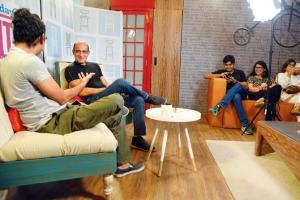
Akshaye Khanna in conversation with Mayank Shekhar, before a live audience, at the mid-day office. Pics /Nimesh Dave
There are two ways to look at a chat with actor Akshaye Khanna. One, that he is so painfully shy, no matter how hard you try, he's unlikely to dig deep and open up (about his life; or otherwise). That said, for the same reason, anything you pointedly ask is likely to elicit a response you haven't heard before. Because we know so little about him anyway — right down to something as rudimentary as his name, which is what we start this edition of Sit With Hitlist with.
Excerpts from the interview
If you Google 'Akshaye', ending with the letter E, the only person likely to show up is you! Is there a story to your name (is it different from 'Akshay')?
You know, I had asked my father this many times, as to why my name's spelt the way it is. There was a specific reason that he had given me, on two or three occasions. And I can't remember. My mum's gone, and my dad's gone as well, so I don't know who to ask.
Even the mystery around your name persists?
So, it was very logical. It has got nothing to do with astrology, or numerology — so there's no juggling or changing of spellings, or anything later. It is my name on the birth certificate. It does mean something that 'Akshay' does not. And there was a specific reason.
Watch the full Sit With Hitlist interview with Akshaye Khanna:
The other mystery: Where do you live?
I've lived at Malabar Hill (in South Bombay) all my life.
You're perhaps the only one in Bollywood who continues to work from South Bombay, which can often be a two-hour commute to where the movie industry is (Bandra northwards)!
No, a lot of people, even from my father's generation, lived in South Bombay — Shashi Kapoor, Shammi Kapoor… Suniel Shetty still lives there. Now with the Sea Link, I can [travel] in 50 minutes. In a couple of years, once the coastal roads come up, there won't be any real distinction between different parts of town. It will be an even easier commute.
Another thing I can't find: Which school did you go to?
I went to Bombay International, which is in Babulnath. Then I went to HR College for a year (for junior college), where I flunked. Then my parents sent me to a boarding school in Ooty, after which I started working. I am not very well educated, and I wasn't very focused on academics.
I'm told you always wanted to be a movie-star ever since you were a teenager. Where did that come from (doing stage in school, perhaps)?
Oh, from much before [my teens], I always knew this is what I wanted to do. But more than that, I never saw myself being able to do anything other than be an actor. I think it was more from seeing my father (Vinod Khanna). I spent a lot of time going to work with him as a kid, which influenced me a lot. I did amateur theatre in school, but I am not a fan. I have huge stage fright. Still do.
Somehow I always felt this [film] was the right fit for me. The first hurdle to cross was telling parents. Once I did that, then it was, kind of, out of my hands! Because dad said he wanted to make a film for me. I have always been naive in life — unable to plan things. Still am. I just go with the flow.
But you were sure of a movie-star career, 'launched' with Himalay Putra (1997), whereas your brother [Rahul Khanna], as anchor, became the face of American MTV in India. Couldn't have been more dissimilar, no?
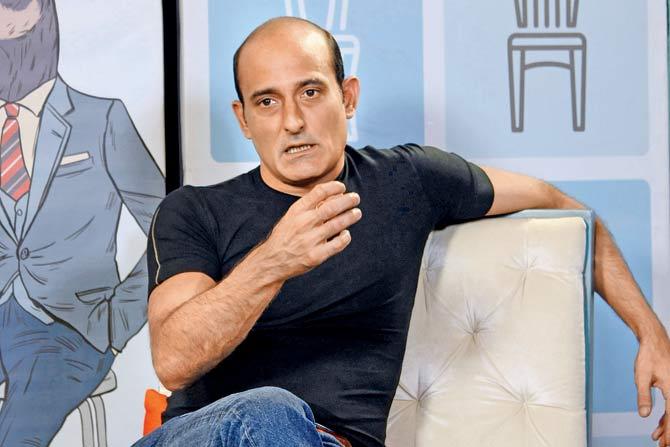
You'd have to ask him [about that]. But entertainment is a funny industry, in terms of what you can start off with, and end up doing. There're so many who wanted to be directors, ended up being actors; or wanted to be actors, but maybe found love for cinematography, editing or sound design. It is that kind of place. You might know you want to be in this environment. But you don't always know exactly what you want to do [within it].
But you were clear about being the Bollywood star, as it were.
I have been, although it's unusual for me to be clear about anything. And I didn't say I wanted to be a movie star. I wanted to be an actor. But if you are a successful actor, then you're a star!
You're also asking me about what I thought about, a long time ago. It's impossible for me to remember. It's really scary how I can't remember things — events, faces, names, it's very blurry. So anything about the past... If you ask me two years from now what I spoke to you about [here], I wouldn't remember. It's always been that way, ever since I was a child. It's very embarrassing.
Okay, let me ask you stuff from (user-generated trivia on) the Internet, and check if you remember any of it being true. One, that Feroze Khan was supposed to launch you first with the film Prem Aggan, which he eventually did with his son Fardeen. And then, Janasheen, which again, he did with Fardeen. True?
No, he had signed me up for a film called Janasheen, I think. It wasn't Prem Aggan. And at that time Fardeen hadn't told his dad that he wanted to be an actor. He did, maybe about six to seven months after he (Feroze) had already signed me up. So obviously [Feroze] came to my dad and said that he will have to make a film with [his son] instead. So, yeah, that's true.
You were supposed to debut with [top director] Mukul Anand in 1994?
In 1994? I can't remember that. No, it can't be 1994, because I started [Himalay Putra] in 1994; it took about two and half years [to make]. But [Mukul Anand] died shortly after that. What year did Mukul Anand die? (1997).
According to Karan Johar, you wouldn't step out of your Alibaugh weekend home, even if invited to pick up the Academy Award. True?
Yeah. I like my weekends in Alibaug.
You apparently have a laundry list of films that didn't roll after you signed up. One that caught our eye is Farhan Akhtar's Voice From the Sky, that he shelved, to make Don 2. True?
True. I've no idea [why]. You'll have to ask Farhan. I remember, it was a really good script. I would do anything with Farhan. He was really excited and keen to make it. He still hasn't.
[Coming to Farhan], you were originally cast in Aamir Khan's role in Dil Chahta Hai (DCH), Aakash, as against Siddharth, that you played eventually; true?
No, out of all three [lead] actors, I was the first person to hear the script [of Dil Chahta Hai]. When I first read it, the role that I wanted to instinctively play was Aamir's. And that's not the role that Farhan wanted me to play. When [Farhan] heard me out, I think he was a little disappointed.
He went and got the cast that he wanted [in place first], and then he came back to me and said, "I know this is what you wanted to do, but this [Sid] is the role I have written for you, and so will you please consider it again?" I heard [the script] again, and again, and again, until I was convinced that what Farhan was saying was right, and I was wrong. So I did that [role].
Aamir Khan returns to your life with Taare Zameen Par. Director Amol Gupte had actually approached you for the lead role?
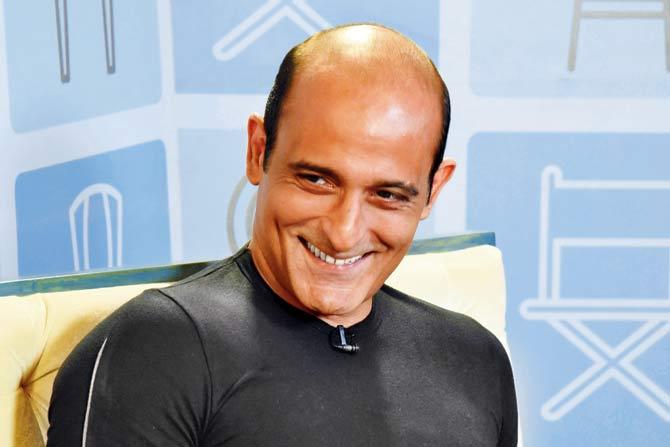
[Amole Gupte] was a friend of Aamir's and he had approached him to get in touch with me. He asked Aamir if he could help [introduce him to me, and to make me hear a narration], since he didn't know me, and Aamir and I had worked together in Dil Chahta Hai. Aamir being Aamir said, "You know I can't recommend a script, unless I hear it first. If I like it, I will tell Akshaye."
He liked it [Taare Zameen Par] so much that he ended up doing it! I was once shooting at one of the studios — if I remember right, Mehboob. Aamir was also shooting on one of the floors. I went to his van to say hi. He was like, oh you know what —this happened. I said, okay, no problem.
Was that a miss?
I don't think I would have done a better job than Aamir. He was superb. So it was good that destiny took him, instead of me.
The other thing about your career are the big gap years —at least two or three blocks of them in your filmography.
Having worked continuously from a very young age, not working is the hardest part. It's depression time — not something that I seek, or look forward to. But somehow, destiny has played its cards in such a way that I've taken certain forced breaks in my career. They never have been by choice, and never will be in future. This is rare, especially in the Hindi film industry, because there are such few actors, and there is so much work.
How do you overcome that phase? Other passions you pursue, playing squash at Willingdon Club, maybe?
You don't. You just go through that phase. Can't play [squash] for three years, no? I am not going to tell you what my day looks like, when I'm not working. Why would you even want to know?
You mentioned somewhere that you had a personal reason for the last break that you took.
I wasn't getting the material that I liked. I didn't want to do anything that was offered to me. So I decided to not do anything, as opposed to something that I just didn't find my heart in, simple — nothing really complicated.
You lost your mom last year, only a year after you lost your dad. Did that have a huge impact on you, personally?
Of course, it would impact anyone. It was a deeply sad time. But everybody has to lose their parents at some point. It is tough. And it is always good that it happens that way; and not the other way round —where parents lose their kid. That would be even worse.
We know nothing about your mother (Kavita Khanna).
That's how she wanted it.
When your father (Vinod Khanna) passed on, the obituaries in the press revealed an incredibly committed yet uniquely free-spirited man. Are there any stories you can recall?
I think once a person who's been in public life for decades is gone, if there is a side of them that they wanted people to know about, they would have managed [to convey] that in their own life, right? So I don't know if there is any aspect of him that I'd like to throw light on, which maybe he didn't [want].
What's in public domain: a man who left everything at the peak of his career to join Osho. You were probably four or five then. Did you want to know, who's this guy [Osho]?
One doesn't look at it like that at five. Osho had nothing to do with my thoughts about why my dad wasn't there. That came much later. As one grows, maybe 15 or 16, you start learning, listening or reading about the person who…
Influenced your father so much...
To not only leave his family, but to take 'sanyaas' (renunciation). Sanyaas means giving up your life in totality — family is [only] a part of it. It's a life-changing decision, which he felt that he needed to take at the time. As a five-year-old, it was impossible [for me] to understand it. I can understand it now.
You can, in what sense?
In the sense that something must have moved him so deeply inside, that he felt that that kind of decision was worth it for him. Especially, when you have everything in life. And when life doesn't look as though there's much more that you can have.
A very basic fault-line/ earthquake has to occur within oneself to make that decision. But also stick by it. One can make the decision and say this doesn't suit me — let's go back. But that didn't happen. And circumstances in America with Osho and the colony, friction with the US government — that was the reason he came back.
Oh, I was given to believe that a lot of people like him got disillusioned with Osho eventually, which led to their return.
From whatever memories I have about my father talking about that time in his life, I don't think that was a reason at all. It was just the fact that the commune was disbanded, destroyed, and everybody had to find their own way. That's when he came back. Otherwise I don't think he would've ever come back.
And you read up on Osho when you became older?
I've read a lot of Osho's discourses and seen hundreds of thousands of videos, I love him.
You could join an Osho commune? They still exist.
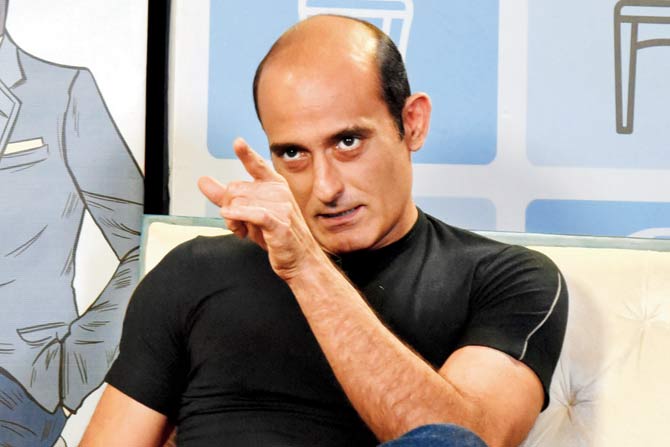
I don't know if sanyaas is something that I could do. But that doesn't mean I can't enjoy his discourses, respect his intellect, oratory skills, and his way of thinking. I have deep respect for him.
[Back to movies] and trivia list, your favourite director is Priyandarshan. True?
One of them. I've done five films with him. And if you take Malayalam, Tamil, Hindi, I'd say Priyan would've done 100-plus films, which is a rare achievement for any director. Some directors like to move on. But he's also tended to repeat actors he's enjoyed working with — Akshay Kumar, Paresh [Rawal], there're many. He has done 30 films with Mohan Lal. I always know when Priyan likes an actor. He makes it obvious. When I was doing Aakrosh (2010) with him and Ajay [Devgn], I told Ajay, he'll definitely offer you a couple of films in the future. They did a film together right after.
You tend to protectively advise co-actors about directors, it seems. Saif (Ali Khan on Sit With Hitlist) told us about how you advised him about becoming warm and breaking ice with Abbas-Mustan during Race (2008), and that he was behaving too much like a star!
Did I? If he [Saif] says so, maybe I did. Abbas-Mustan are very gentle people. I've done four films with them. When they direct you, and even in their personal life, they are very soft. You have to be very soft with them, otherwise they clam up. You cannot be loud and aggressive. And Saif, sometimes, can be a little, you know how Saif is... I must have told him something to that [effect], I don't know. But I think they got along fine.
(Audience) Loved your film Section 375. What did you think of the timing of the film's release — coming a year after the MeToo movement? How do you think it changed the narrative around the movement itself?
The timing was never the intention. Neither was it the purpose of making the film. It was just a great story. It [delved on a] topic of the time. Which it always will be, because there are always people from both sexes, who don't know how to behave appropriately. Having said that, Section 375 is a film that I am very proud to have in my filmography.
Sometimes, box-office numbers of a film are not always commensurate with the quality of a product. This film I will continue to be proud of. It will age well. Take Andaz Apna Apna (1994), it flopped, when it released. It is considered one of the comedy classics of Hindi cinema. Another example: Shawshank Redemption, it was a disaster at the box-office, but it tops all lists of greatest films ever. I'm not comparing Section with Shawshank, but it is an example.
Having been an actor for over 20 years — with Section 375, one sensed that you were totally stepping out of the usual tropes and mannerisms that we've of course admired you onscreen for. Would you agree?
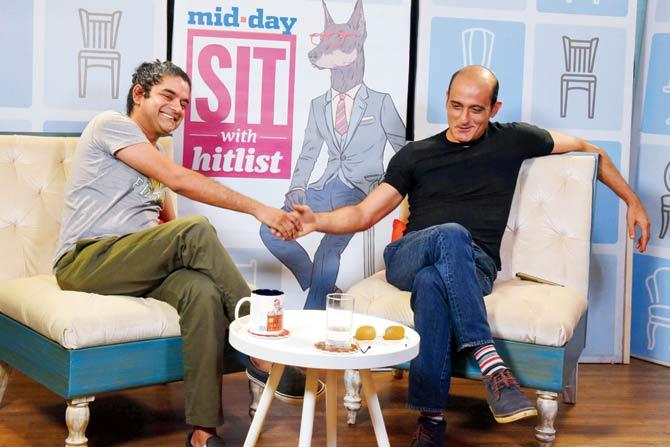
On the contrary — to be able to engage an audience purely through dialogue, without other things, itself is not easy. And it's a combination of how you are directed, and how you perform. But the direction side is more important. That's why I felt very satisfied, creatively, with the way Ajay [Bahl] directed Section 375.
It's very easy for a director to impose direction on an actor, when it's really not required. And I think Ajay has a very good sense of when to direct an actor, and when to not direct. That's very important. I don't know if I am making any sense.
Yes, you are.
Acting has been primarily one thing — being in the moment. Like, in the last few years, I've been noticing that we always do photo-shoots for a film's poster and publicity material. I just don't like the quality of photo-shoots — no matter how good the photographer or subject is. Since everything is digital now, a great alternative is you remove a frame from a scene of the film. It is always more honest. Eyes are more honest. The actor is acting. That 'being in the moment' doesn't come across in the photo-shoot. You understand what I'm saying?
Would you say that about dubbing as well, as against sync sound?
I wouldn't compare it with dubbing, no. But I know what you're saying. Sync sound is way more honest than dubbing. It has to be, right? It is like real life is more honest than fiction.
Saying this because Dil Chahta Hai also got credited with reviving sync sound in mainstream Hindi films in a way.
Yeah, the realism of sync sound was lost to Hindi cinema for many decades. I think millions of performances that have been dubbed for so many decades would have lost a certain edge [as a result]. I've worked the majority of my career dubbing in my films. Only in the last 10-12 years, we've been spoilt with sync sound. I really feel bad for actors who never had sync sound. Not that they knew the difference, because they never experienced it, but I still feel bad for them.
Do you closely follow latest releases/films?
Yeah. I primarily watch at home. I might wait three months for it to come on one of the platforms, but I will watch it.
Two back-to-back releases in 2019 were Bala, and Ujda Chaman (by the same producers as Section 375). Did you get to watch them?
Haven't watched yet. But will, when it comes (on web platforms).
They were both on premature balding, and how it affects confidence levels. You've had that situation in your life. Is it such a big deal?
Well, because it started happening to me at such a young age, it was like a pianist losing his fingers. It almost felt like that to me, in those days. Till you really come to terms with it, and then it starts bothering you less. It's like, I suppose, waking up one morning and saying, "Oh shit, I can't read!" So it would affect you, right?
Or you get up in the morning and your knees are paining, and the pain just won't go away. You take a Combiflam for pain relief, and you might realise you need a knee surgery at a very young age. And you might be a sportsperson, so it is heartbreaking. You might lose a year or two of your career. So, as I said, it is like a pianist losing his fingers. Because the way you look as an actor is very important.
And especially this part (pointing to the face upwards). [Balding] at 19 or 20 is devastating. It can mentally like kill you. But, as I said, it is like anything else — someone needs glasses, someone needs something else... It's up to you, and what you are comfortable with doing [about it].
Did it affect your confidence levels as an actor at some point?
I think it did affect my self-confidence as a young actor — more than I'd like to admit, actually. Definitely.
(Audience) Lot of actors these days interact with their fans through social media. Do you ever intend on doing so?
Can't say for the future, but right now, whatever I hear from my colleagues, especially my friends on social media, I've never got a sense that it is something constructive. It just doesn't serve any purpose. I am not comfortable with it.
(Audience) Do you think you resonate more with the scripts being offered/churned out today than, say, 2001/2002?
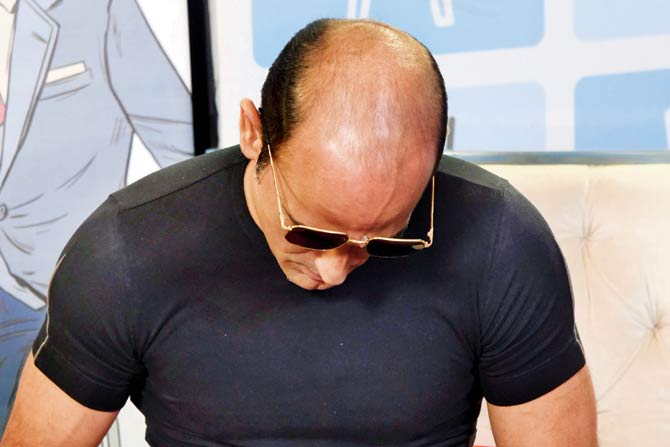
People's memories are short. So they kind of think that what I'm doing now, is what I have always wanted to do, but never got those opportunities before. That's never the case. Your current choices in films, at least for me, are very instinctive. They are not well planned, or thought out. And some of those films might not appear to be hardcore commercial cinema.
But when I view myself as an actor, I see myself as a very hardcore commercial actor, given the choices of my films, right from the beginning of my career. I do understand, especially since I have started working more regularly in the last two to three years, that my choices have been a little cerebral — if that's a word you could use for, say, even Mom, Ittefaq, Accidental [Prime Minister], or Section [375]. But that is just some choices of films. I don't intellectualise it. And neither should you.
Are there films you've seen lately that you wished were offered to you?
When I watch most films I always feel that the person who has done those parts has done them better than I could.
Any script you can remember saying no to, which turned out to be a pretty good film?
Yeah. Saif's role in Parineeta (2005). I didn't do it for some reason. I don't know why. After the film released, I called up [producer Vidhu] Vinod [Chopra] and said I really enjoyed the film, and wish I had done it. You know how Vinod is. He said, "Yeah, I told you, you should have; you're such a b******, d***, and this, and that!" I was, like, fine.
There are times you could be in a bad mood, when you hear a script. There could be so many things that influence your decision. So, yeah, sometimes things slip out of your hands. And sometimes things fall into your lap, which you never expected.
For example, I did an out-and-out negative role in [Abbas-Mustan's] Humraaz (2002), which I believe five or six major leading actors were approached for, and they'd said no to. But when I heard it, I loved it. That was one of the first negative roles I did. So it happens all the time.
Last question: You might be the only person in Indian showbiz to take a stand on an institution, and say that you'll never get married! And that you want to live alone "forever".
I have always known instinctively that I would very much prefer to live my life without someone by my side all the time. I find that suffocating. That's the only reason.
Do you go on dates?
All the time. But to commit to a lifetime of togetherness is virtually impossible for me.
Serially monogamous — is that what it would mean?
No, it means knowing oneself reasonably well enough to not ruin somebody else's life!
Okay, final question: Are you (mentally) exhausted (after this interview)?
No I loved it, really enjoyed it.
Catch up on all the latest entertainment news and gossip here. Also download the new mid-day Android and iOS apps to get latest updates
 Subscribe today by clicking the link and stay updated with the latest news!" Click here!
Subscribe today by clicking the link and stay updated with the latest news!" Click here!







